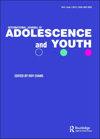考察弹性学校如何支持边缘化青年的心理健康:一项纵向研究
IF 2.2
Q3 PSYCHOLOGY, DEVELOPMENTAL
International Journal of Adolescence and Youth
Pub Date : 2022-04-06
DOI:10.1080/02673843.2022.2057231
引用次数: 0
摘要
摘要:对于那些通过灵活学习重新融入学习的边缘化学生,关于纵向生活结果(如就业和幸福感)的定量数据很少。本文报道了学校令人满意的心理健康与放学后生活质量之间的纵向关联。澳大利亚一个地区城市一所灵活学习校园的41名年龄在18岁至31岁之间的往届学生在学校Facebook页面上进行了为期6个月的在线调查。该调查测量了在校期间心理需求的满意度(自主性、相关性和能力),以及当前的生活质量因素(收入、就业、积极关系、情绪和成就等)。双变量相关结果表明,对学校基本心理健康的满意度越高,与以后生活中心理和健康因素的改善直接相关。这对支持基于纵向健康福利的学校心理健康投资的研究具有启示意义。本文章由计算机程序翻译,如有差异,请以英文原文为准。
Examining how flexi schools support the psychological wellbeing of marginalized youth: a longitudinal study
ABSTRACT There exists little quantitative data on longitudinal life outcomes, such as employment and wellbeing, for marginalized students who reconnect with learning via flexible learning. This article reports on longitudinal associations between satisfying psychological wellbeing at school and quality of life after school. Forty-one past students of a flexible learning campus in a regional Australia City, aged between 18 and 31 years responded in an online survey, available over a 6-month period, on the school Facebook page. The survey measured satisfaction of psychological needs when at school (autonomy, relatedness and competence), and current quality of life factors (income, employment, positive relationships, emotions and accomplishment etc.). Bivariate correlation results suggested that greater satisfaction of basic psychological wellbeing at school is directly associated with improved psychology and wellbeing factors in later life. This has implications for research supporting investment in psychological wellbeing at school based on longitudinal wellbeing benefits.
求助全文
通过发布文献求助,成功后即可免费获取论文全文。
去求助
来源期刊

International Journal of Adolescence and Youth
PSYCHOLOGY, DEVELOPMENTAL-
CiteScore
8.80
自引率
2.20%
发文量
32
审稿时长
9 weeks
期刊介绍:
nternational Journal of Adolescence and Youth aims to identify, examine and compare particular issues, problems and policies related to adolescents and youth throughout the world. Subject areas covered include psychological growth and development, health and medical care, delinquency, social policy, employment and unemployment, education and training, spiritual and physical development, leisure, family relationships, sex education, homelessness. The Journal will be of interest to researchers in those areas, university and other higher education institutions, as well as to international, central and local government and voluntary organizations and field work agencies.
 求助内容:
求助内容: 应助结果提醒方式:
应助结果提醒方式:


